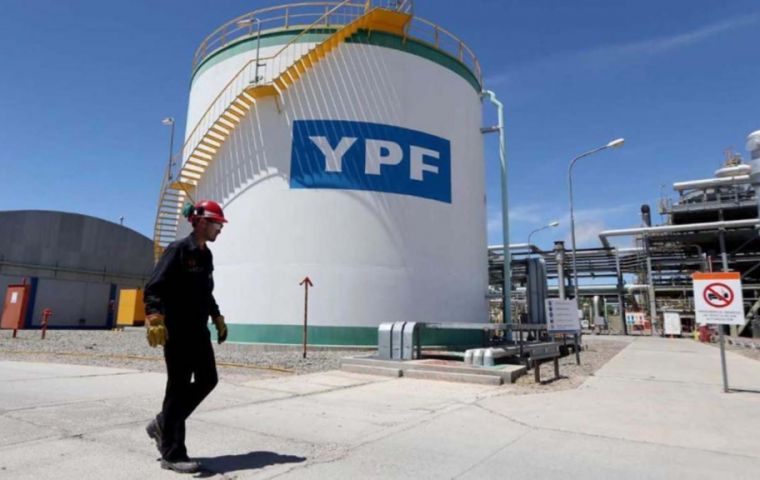MercoPress. South Atlantic News Agency
LNG project to go on with or without Petronas, YPF CEO says
 Local media are mentioning a 95% probability that the Malayan company would back down due to a slump in expectations
Local media are mentioning a 95% probability that the Malayan company would back down due to a slump in expectations Argentina's State-run oil company YPF CEO Horacio Marín admitted that the highly-announced US$ 30 billion joint Liquefied Natural Gas (LNG) venture with Malaysia's Petronas in Patagonia would go ahead despite the Asian partner's alleged intention to withdraw from it.
The plant originally conceived to be located in Bahía Blanca in the province of Buenos Aires was shifted to Sierra Grande in the province of Río Negro in what was regarded as a move by President Javier Milei's Libertarian administration to favor Governor Alberto Weretilneck over the Kirchnerite Axel Kicillof through the newly-approved Incentive Regime for Large Investments (RIGI) featured in the ruling party's pillar known as the Bases Law.
Marín said in a radio interview that Petronas had yet to decide in November whether to disburse nearly US$ 200 million for the engineering design of FLNGs (floating liquefied natural gas production units).
In case Petronas backs down, Marín admitted he had been having talks with other LNG industry giants and other oil companies operating in the country to take over.
Meanwhile, Weretilneck guaranteed YPF would keep the LNG project afloat and therefore “we are calm.” He also downplayed the possibility of Petronas having second thoughts and insisted that Marín had decided to move on with the project.
The project was initially conceived under former President Alberto Fernández, who was politically aligned with Kicillof. Under Milei, it was reshaped to Rio Negro and now Argentine media are mentioning “a 95% possibility” that Petronas will now move on after a slump in expectations.
In late July, the Libertarian administration announced the location shift claiming that a plant in Sierra Grande, Río Negro, would offer numerous advantages. Were it to go ahead, the YPF-Petronas consortium would become the fifth global LNG producer, it was also explained.
Among the reasons for choosing Río Negro was that it meant shorter pipelines for the natural gas from Vaca Muerta, in addition to the sea depth in the Sierra Grande area which would reduce the need for dredging to achieve an adequate draft. The experts also considered the availability of larger portions of land and lower interference with other social and economic activities in the area. Furthermore, the province of Río Negro offered optimal conditions for the development of the project seeking to boost the Patagonian economy, it was argued.
Both companies highlighted in a statement that Río Negro has “better economic aspects for the project, even if Buenos Aires were to match the tax benefits,” according to a report from the international consulting firm Arthur D. Little. Río Negro can develop a deep water port where large “supertanker” ships can enter and lower transportation costs, it was also explained. In short, the Sierra Grande area “appears as the best option,” the document went on.
YPF and Petronas would also be seeking to lure the other oil companies in the country involved in natural gas production (PAE, Total Austral, Tecpetrol, Pampa Energía, CGC, and Wintershall Dea, among others) to join a partnership for large-scale exports, it was mentioned back then.
The Sierra Grande LNG plant is expected to generate numerous direct and indirect jobs with the reactivation of the Punta Colorada port, which could in turn attract other industries to settle in the area.




Top Comments
Disclaimer & comment rulesCommenting for this story is now closed.
If you have a Facebook account, become a fan and comment on our Facebook Page!